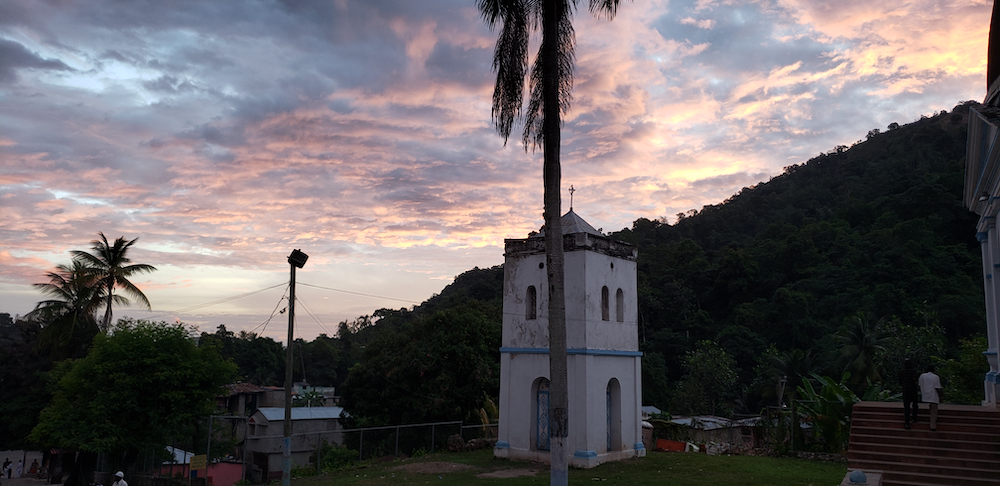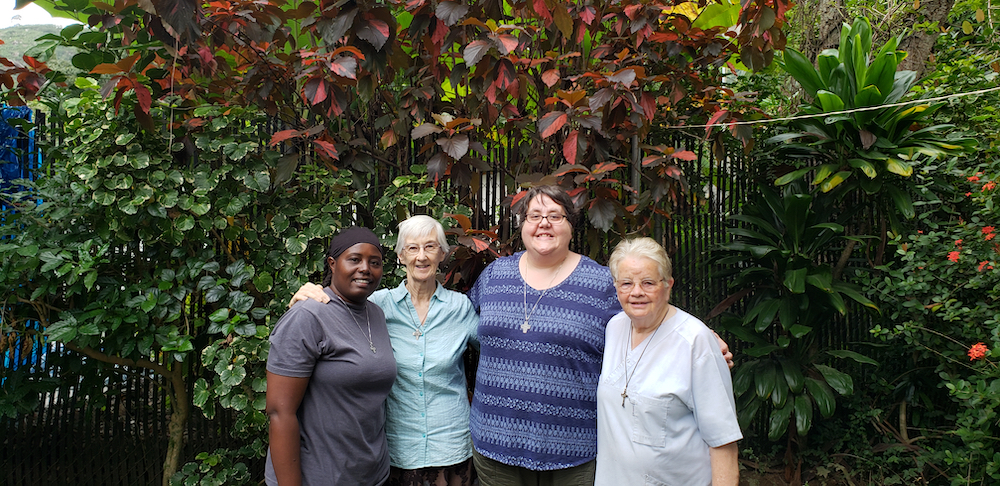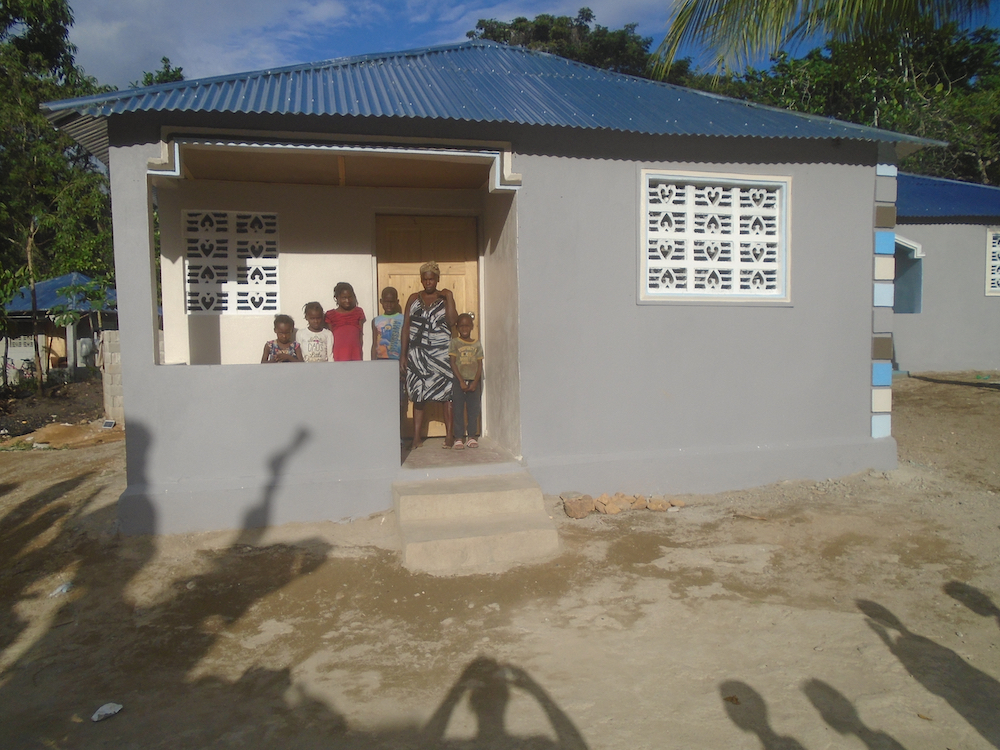
View of Massif du Nord mountains on Christmas morning (Susan Rose Francois)
Once upon a time, I was asked to write an article with a curious title, "Why Catholics Care About People Living in Poverty," for Vision magazine, a wonderful resource from the National Religious Vocation Conference. The answer to the question, which I managed to find more than 1,500 words to illustrate, was in the end summed up by one word … Jesus.
As followers of Christ, we love those he loved. As those who believe in the preeminent values of life and human dignity, we have a preferential option for people who are made poor and vulnerable. As Christians, we are called to love our neighbors as ourselves.
This Christmas, I had an opportunity to meet some new-to-me neighbors in Haiti, just about 2,000 miles off the coast of Florida. Our neighbors in Haiti experience incredible poverty. The World Bank reports that more than 6 million people there live below the poverty line, on less than $2.41 per day. More than 2.5 million live in extreme poverty, defined as less than $1.23 per day. This means that Haiti has the highest level of poverty in the Western Hemisphere. This I knew, at least intellectually.
What I did not know, until my visit, was the extent of Haiti's natural beauty. Milot, the town where I spent Christmas, is among the foothills of the Massif du Nord mountain range. Mountain views and tropical beauty abound from seemingly every vantage point. And the flowers!
What I did not know, until my visit, was the incredible strength and hospitality of the Haitian people. Almost every person I met, no matter their age, asked me about the health of my family (which, I discovered, is a common greeting in Haiti). The rigors of daily life — carrying water, finding food, selling wares — require both physical and spiritual strength.
What I did not know, until my visit, was how the harsh economic reality which I thought I knew about intellectually would become etched on my heart, as would the people I was privileged to meet. Since my return home, I cannot help but ponder in my heart the words of Mother Francis Clare (Margaret Anna Cusack), the founder of the Sisters of St. Joseph of Peace: "It did matter to me a great deal in view of our common humanity, and in view of my love of the poor, that I should do all I could for those whom He had loved so well."
Advertisement
It was this love that led the Sisters of St. Joseph of Peace to begin a ministry of presence in Milot, a small town in the north of Haiti, just months before the 2010 earthquake. In 2012, Holy Name Medical Center (a ministry of the Sisters of St. Joseph of Peace)* acquired the CRUDEM Foundation, which provides financial, medical and volunteer resources to support the life-saving ministry of Hôpital Sacré Coeur in Milot.
Hôpital Sacré Coeur is unique. Founded by the Brothers of the Sacred Heart of Montreal in 1968, the hospital today is managed by a team of Haitian hospital administrators. Local medical and support staff work hand in hand with medical volunteers from the U.S., Cuba and beyond to provide quality medical care in challenging circumstances. The hospital is the largest employer in the region, offering good wages for good work in a place where formal work is very rare.
Our sisters live in a convent on a compound that also has houses for Haitian staff and foreign volunteers. There, Sr. Maureen Boggins teaches English classes in the library to hospital staff and local residents of all ages. She also manages a scholarship fund, supported by donations, for students who would otherwise be unable to afford school fees.
Sr. Ann Crawley, meanwhile, uses a small room in the back of the convent as the home base for her outreach ministry, preparing packages of food and clothing to deliver to those in need, especially the visually impaired and orphaned. Sister Ann is aided by a group of young people she has mentored since her arrival in Milot. Now teenagers, they help her put together the food packages and often accompany her on her visits to distribute them.

Sister Chero (also visiting), Sister Maureen, Sister Susan, and Sister Ann pose outside the convent in Milot, Haiti (Provided photo)
My friend and novice classmate Sister Chero and I were both spending Christmas in Haiti. On our various strolls around town, the impact of our sisters' presence became clear. For example, Sister Maureen was forever running into current or former students, eager to practice their English. Two former students, home for Christmas, proudly shared their academic progress with her. Whenever we passed by a local primary or high school, she would regale us with stories of the students that have received scholarships through the sisters' fundraising efforts.
Sister Ann invited us to tour two construction sites where she is using donations to hire local laborers and craftspeople to build simple homes for those who are homeless or living in unsafe conditions. "Haiti has been badly hit by many hurricanes and natural disasters over the years," she says. "As a result, many families are homeless and live in shacks held together by pieces, rusted tin and bamboo sticks."
Her father was a builder, so perhaps it's no surprise that Sister Ann has stumbled upon this ministry of commissioning homes for families in need. She estimates she has helped build more than 300 houses in Milot. A simple house with two or three rooms costs about $5,000-$6,000 for labor and materials.
I have long known about this ministry — she is an indefatigable fundraiser! What I did not realize until my visit was the economic impact of building houses using local labor and local materials. It was incredible to visit the building site and see how they manage to build a house by hand without any electricity. Even the furniture for the new houses is built by local craftspeople. It was heartening to see the pride of those working on the building sites, as well as the pride of new homeowners.
It was also heartbreaking to realize how much more need there is for safe housing and reliable paid work. When I returned home, I couldn't get the people of Milot out of my mind and heart. Within 24 hours, I had set up an online fundraising campaign to build one small simple house for a family in need.
There are no simple solutions to systemic injustice and global inequality. Yet, my short Christmas visit to Milot, and the witness of Sisters Ann and Maureen and Holy Name Medical Center, have deepened my understanding that doing something is better than doing nothing. Empowering and supporting the local people is critical to a sustainable solution. And sometimes, charity simply can't wait for the long arc of justice.

A family stands in the doorway of their new home (Susan Rose Francois)
*An earlier version of this column did not label the center correctly.
[Susan Rose Francois is a member of the Congregation Leadership Team for the Sisters of St. Joseph of Peace. She was a Bernardin scholar at Catholic Theological Union and has ministered as a justice educator and advocate. Read more of her work on her blog, At the Corner of Susan and St. Joseph.]







